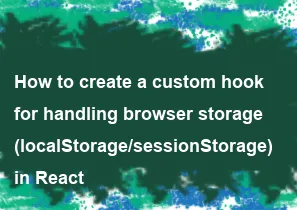How to create a custom hook for handling browser storage (localStorage/sessionStorage) in React

Creating a custom hook for handling browser storage in React, specifically localStorage or sessionStorage, involves encapsulating the logic for reading from and writing to browser storage within a reusable hook. Here's how you can implement it:
javascriptimport { useState } from 'react';
const useLocalStorage = (key, initialValue) => {
// Retrieve the initial value from localStorage if it exists, otherwise use the initialValue
const [storedValue, setStoredValue] = useState(() => {
try {
const item = window.localStorage.getItem(key);
return item ? JSON.parse(item) : initialValue;
} catch (error) {
console.error('Error retrieving data from localStorage:', error);
return initialValue;
}
});
// Update the localStorage value when the storedValue changes
const setValue = (value) => {
try {
const valueToStore =
value instanceof Function ? value(storedValue) : value;
setStoredValue(valueToStore);
window.localStorage.setItem(key, JSON.stringify(valueToStore));
} catch (error) {
console.error('Error saving data to localStorage:', error);
}
};
return [storedValue, setValue];
};
export default useLocalStorage;
Usage example:
javascriptimport React from 'react';
import useLocalStorage from './useLocalStorage';
const App = () => {
// Using useLocalStorage hook
const [name, setName] = useLocalStorage('name', 'John');
return (
<div>
<input
type="text"
value={name}
onChange={(e) => setName(e.target.value)}
/>
<p>Hello, {name}!</p>
</div>
);
};
export default App;
In this custom hook:
useLocalStoragetakes two arguments:key(the key under which the value will be stored inlocalStorage) andinitialValue(the default value if the key does not exist inlocalStorage).- It initializes the state with the value from
localStorageor theinitialValueif the key doesn't exist. - It provides a
setValuefunction to update the state and persist the new value tolocalStorage. - It returns the current value and the
setValuefunction, mirroring the API ofuseState.
You can follow a similar pattern for sessionStorage by replacing localStorage with sessionStorage in the hook.
-
Popular Post
- How to optimize for Google's About This Result feature for local businesses
- How to implement multi-language support in an Express.js application
- How to handle and optimize for changes in mobile search behavior
- How to handle CORS in a Node.js application
- How to use Vue.js with a UI framework (e.g., Vuetify, Element UI)
- How to configure Laravel Telescope for monitoring and profiling API requests
- How to create a command-line tool using the Commander.js library in Node.js
- How to implement code splitting in a React.js application
- How to use the AWS SDK for Node.js to interact with various AWS services
- How to use the Node.js Stream API for efficient data processing
- How to implement a cookie parser middleware in Node.js
- How to implement WebSockets for real-time communication in React
-
Latest Post
- How to implement a dynamic form with dynamic field styling based on user input in Next.js
- How to create a custom hook for handling user interactions with the browser's device motion in Next.js
- How to create a custom hook for handling user interactions with the browser's battery status in Next.js
- How to implement a dynamic form with dynamic field visibility based on user input in Next.js
- How to implement a dynamic form with real-time collaboration features in Next.js
- How to create a custom hook for handling user interactions with the browser's media devices in Next.js
- How to use the useSWRInfinite hook for paginating data with a custom loading indicator in Next.js
- How to create a custom hook for handling user interactions with the browser's network status in Next.js
- How to create a custom hook for handling user interactions with the browser's location in Next.js
- How to implement a dynamic form with multi-language support in Next.js
- How to create a custom hook for handling user interactions with the browser's ambient light sensor in Next.js
- How to use the useHover hook for creating interactive image zoom effects in Next.js